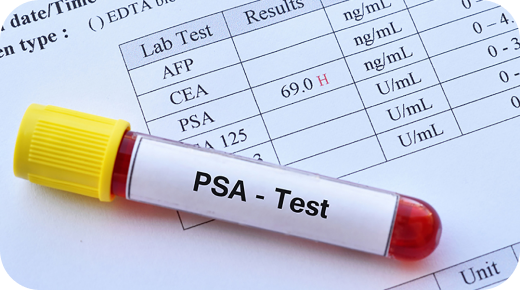PSA TEST
The PSA test, or prostate-specific antigen test, measures the level of a protein called prostate-specific antigen (PSA) in the blood.
Price: $37

ABOUT THE TEST
The Prostate-Specific Antigen (PSA) test is a blood test designed to assess the level of a specific protein, prostate-specific antigen, in the bloodstream. Widely utilized for prostate health evaluation, the PSA test serves as a crucial tool in screening for prostate cancer and monitoring overall prostate health. Here’s an overview of its components and significance:
Purpose:
The primary goal of the PSA test is the early detection of prostate cancer. Elevated PSA levels may indicate the presence of cancerous or noncancerous conditions in the prostate.
Interpretation of Results:
PSA levels are measured in nanograms per milliliter (ng/mL). Elevated levels may prompt further investigation, though it’s important to note that elevated PSA doesn’t conclusively diagnose prostate cancer.
Age and Risk Factors:
PSA levels can naturally increase with age, and “normal” levels may vary. Consideration of individual risk factors, such as family history and race, is essential in result interpretation.
Follow-Up Tests:
Elevated PSA levels may lead to additional tests, like a prostate biopsy, to confirm the presence of cancer or rule out other prostate conditions.
Controversy and Limitations:
The PSA test has sparked debates due to its potential for false positives and false negatives. It may lead to unnecessary procedures or miss cases of cancer.
Monitoring Treatment Effectiveness:
For individuals with diagnosed prostate cancer, the PSA test is utilized to monitor the effectiveness of treatment. Changes in PSA levels may indicate a positive or negative response to therapy.
